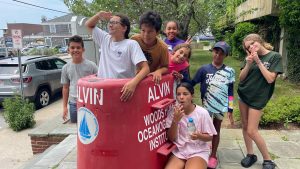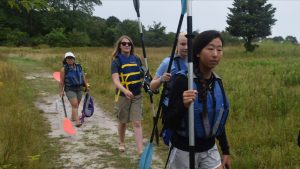Search results for: last%20minute%20cheap%20airlines%20tickets%20phone%20number%201-800-299-7264
Preserving Our Homelands Camp Comes to WHOI
Most science educators will tell you, if you want to get kids excited about science, you have to actually do science. Last summer WHOI Sea Grant had the opportunity to participate in the annual “Preserving Our Homelands” (POH) camp, an interactive summer science camp for Mashpee Wampanoag Tribal middle schoolers. Through activities and outings, including visits…
Read MoreGrowth of the Bay Scallop, Argopecten irradians, in a Waste Recycling Aquaculture System
Growth of the Bay Scallop, Argopecten irradians, in a Waste Recycling Aquaculture System Mann, R. and R.E. Taylor Jr. Aquaculture, Vol. 24, pp. 45-52, 1981 WHOI-R-81-001 Growth of the bay scallop Argopecten irradians in a pilot scale waste recycling aquaculture system was examined over a 32-week-period at 14Á C. A. irradians increased from initial live…
Read MoreNew Shoreline Change Data Reveal Massachusetts is Eroding
New Shoreline Change Data Reveal Massachusetts is Eroding Helpful to educators and students. O’Connell, J.F. Marine Extension Bulletin, 4 pp., 2003 WHOI-G-03-001
Read MoreWHOI-R-77-012
WHOI-R-77-012
Read MoreSurf Clams
Surf Clams In the marketplace, one-year-old surf clams are known as “New England Butter Clams” – a relatively new product on the market. Farming New England Butter Clams means they can be harvested at a size in which they are tender, buttery and sweet – as well as easy and versatile to prepare. This results…
Read MoreThe Barnstable Harbor Shellfish Recruitment Enhancement Project (BHSREP): A Final Report
The Barnstable Harbor Shellfish Recruitment Enhancement Project (BHSREP): A Final Report Marcotti, T. and D.F. Leavitt 47 pp, $3.00, 1997 WHOI-T-97-001
Read MoreMy Girls in Science Experience – by Eugena Choi
Last February, when I heard about the Woods Hole Girls in Science program, I was excited. It combined my passion for conservation with marine biology, and I decided – on the spot – that I was going to go. I worked on my application for months before sending it in, and when I got the…
Read MoreLarval Exposure to 4-Nonylphenol and 17ß-Estradiol Affects Physiological and Behavioral Development of Seawater Adaptation in Atlantic Salmon Smolts
Larval Exposure to 4-Nonylphenol and 17ß-Estradiol Affects Physiological and Behavioral Development of Seawater Adaptation in Atlantic Salmon Smolts Lerner, D.T., B. Thrandur Björnsson, and S.D. McCormick Environ. Sci. Technol., Vol. 41, pp. 4479-4485, 2007 WHOI-R-07-006
Read MoreMolecular Analysis of a RAPD Marker (B20) Reveals Two Microsatellites and Differential mRNA Expression in Penaeus vannamei
Molecular Analysis of a RAPD Marker (B20) Reveals Two Microsatellites and Differential mRNA Expression in Penaeus vannamei Garcia, D.K., A.K. Dhar, and A. Alcivar-Warren Molecular Marine Biology and Biotechnology, Vol. 5, No. 1, pp. 71-83, 1996 WHOI-R-96-001
Read MoreCitizen Science: Improving Water Quality in Waquoit Bay
Citizen Science: Improving Water Quality in Waquoit Bay By Dr. Nicole Millette Nicole Millette in the lab March 2018 – Nutrient pollution, particularly nitrogen, is a widespread problem in coastal waters, and a vexing issue for environmental managers as well as those living near these waters. As a Sea Grant-funded Postdoctoral Fellow in Marine Policy,…
Read More

